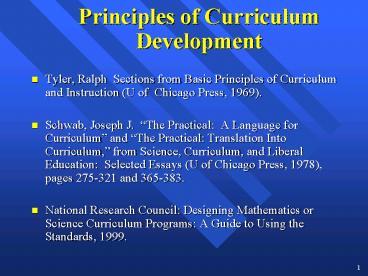Principles of Curriculum Development - PowerPoint PPT Presentation
1 / 12
Title:
Principles of Curriculum Development
Description:
... development team begins with a set of beliefs about content, students, their ... pros and cons of each proposal then make a judgment about best courses of action. ... – PowerPoint PPT presentation
Number of Views:13019
Avg rating:3.0/5.0
Title: Principles of Curriculum Development
1
- Principles of Curriculum Development
- Tyler, Ralph Sections from Basic Principles of
Curriculum and Instruction (U of Chicago Press,
1969). - Schwab, Joseph J. The Practical A Language
for Curriculum and The Practical Translation
Into Curriculum, from Science, Curriculum, and
Liberal Education Selected Essays (U of Chicago
Press, 1978), pages 275-321 and 365-383. - National Research Council Designing Mathematics
or Science Curriculum Programs A Guide to Using
the Standards, 1999.
2
I. Overview of Tylers Model of Curriculum
Development
- Tylers approach to curriculum design is
related to four fundamental questions that need
to be answered in developing any curriculum and
plan of instruction.
3
- 1. What educational purposes should the school
seek to attain? - 2. What educational experiences can be provided
that are likely to attain these purposes? - 3. How can these educational experiences be
effectively organized? - 4. How can we determine whether these purposes
are being attained?
4
Therefore the major components of Tylers Model
of Curriculum Development are
- State objectives
- Select learning activities
- Organize learning activities
- Develop means of evaluation
5
- Tyler stated that objectives should be very
simple (behavioral objectives).
Objectives should state a. what is to be
learned b. what changes should occur in students
6
Other big ideas from Tyler
- All schools should develop their own educational
philosophy and from this, objectives should be
derived. - Ideas from psychology of learning should be used
in developing effective curricula. - Curriculum works as a system learning
experiences support objectives which support
philosophy.
7
II. Overview of Schwabs Ideas of Curriculum
Development
- Schwabs approach deals with the practical rather
than the theoretical. Curriculum decisions do
not require a curriculum theory.
8
Aspects of Schwabs practical approach include
- Changes should be made by piecemeal improvement,
not by major overhaul (if it isnt broke, dont
fix it). - Determine the whole array of possible effects of
proposed changes. Diagnose the ills of the
curriculum.
9
More on Schwabs practical approach
- Deliberation is essential the careful
consideration of a variety of alternative courses
of action in specific situations. - The deliberation process requires a sophisticated
understanding of the existing practices and their
effects.
10
Example of the deliberative process
- Curriculum development team begins with a set of
beliefs about content, students, their needs, and
how they learn, about schools, classrooms,
teachers, society and its needs, and about images
of good teaching. They propose courses of
action, discuss pros and cons of each proposal
then make a judgment about best courses of action.
11
Curriculum building involves
- Deliberation considering multiple facets of the
learner, the classroom, the teacher and society.
- Focus on the particulars of the situation
- Consideration of a variety of alternatives
- Judgment --implies that we need to ask ourselves
what our purposes are and how we might achieve
them.
12
National Research CouncilDesigning Mathematics
or Science Curriculum Programs A Guide for Using
Mathematics Science Education Standards
- Components of Coherent Science Education
Curriculum Programs - Goals
- Content Standards
- Curriculum Framework
- Instructional Materials that Support the
Standards - Teaching Strategies
- Assessment

